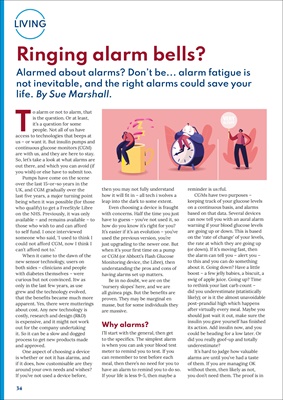
34
LIVING
Ringing alarm bells?
Alarmed about alarms? Don't be... alarm fatigue is
not inevitable, and the right alarms could save your
life. By Sue Marshall.
To alarm or not to alarm, that
is the question. Or at least,
it's a question for some
people. Not all of us have
access to technologies that beeps at
us - or want it. But insulin pumps and
continuous glucose monitors (CGM)
are with us, and they are here to stay.
So, let's take a look at what alarms are
out there, and which you can avoid (if
you wish) or else have to submit too.
Pumps have come on the scene
over the last 15-or-so years in the
UK, and CGM gradually over the
last five years, a major turning point
being when it was possible (for those
who qualify) to get a FreeStyle Libre
on the NHS. Previously, it was only
available - and remains available - to
those who wish to and can afford to
self fund.
I once interviewed someone
who said, 'I used to think I could not
afford CGM, now I think I can't afford
not to.'
When it came to the dawn of the
new sensor technology, users on
both sides - clinicians and people
with diabetes themselves - were
curious but not convinced. Itw as
only in the last few years, as use
grew and the technology evolved,
that the benefits became much more
apparent. Yes, there were mutterings
about cost. Any new technology is
costly, research and design (R&D)
is expensive, and it might not work
out for the company undertaking
it. So it can be a slow and dogged
process to get new products made
and approved.
One aspect of choosing a device
is whether or not it has alarms, and
if it does, how customisable are they
around your own needs and wishes?
If you've not used a device before,
then you may not fully understand
how it will fit in - all tech involves a
leap into the dark to some extent.
Even choosing a device is fraught
with concerns. Half the time you just
have to guess - you've not used it, so
how do you know it's right for you?
It's easier if it's an evolution - you've
used the previous version, you're
just upgrading to the newer one. But
when it's your first time on a pump
or CGM (or Abbott's Flash Glucose
Monitoring device, the Libre), then
understanding the pros and cons of
having alarms set up matters.
Be in no doubt, we are on the
'nursery slopes' here, and we are
all guinea pigs. But the benefits are
proven. They may be marginal en
masse, but for some individuals they
are massive.
Why alarms?
I'll start with the general, then get
to the specifics. The simplest alarm
is when you can ask your blood test
meter to remind you to test. If you
can remember to test before each
meal, then there's no need for you to
have an alarm to remind you to do so.
If your life is less 9-5, then maybe a
reminder is useful.
CGMs have two purposes -
keeping track of your glucose levels
on a continuous basis, and alarms
based on that data. Several devices
can now tell you with an aural alarm
warning if your blood glucose is are
going up or down. This is based on
the 'rate of change' of your levels,
the rate at which they are going up
(or down). If it's moving fast, then
the alarm can tell you - alert you -
to this and you can do something
about it. Going down? Have a little
boost - a few jelly babies, a biscuit, a
swig of apple juice. Going up? Time
to rethink your last carb count -
did you underestimate (statistically
likely); or is it the almost unavoidable
post-prandial high which happens
after virtually every meal. Maybe
should just wait it out, make sure the
insulin you gave yourself has finished
its action. Add insulin now, and you
could be heading for a low later. Or
did you really goof-up and totally
underestimate?
It's hard to judge how valuable
alarms are until you've had a taste
of them. If you are managing OK
without them, then likely as not,